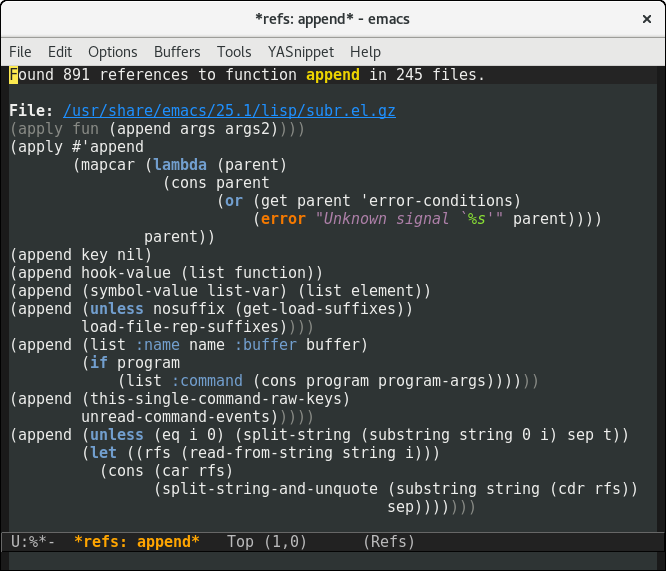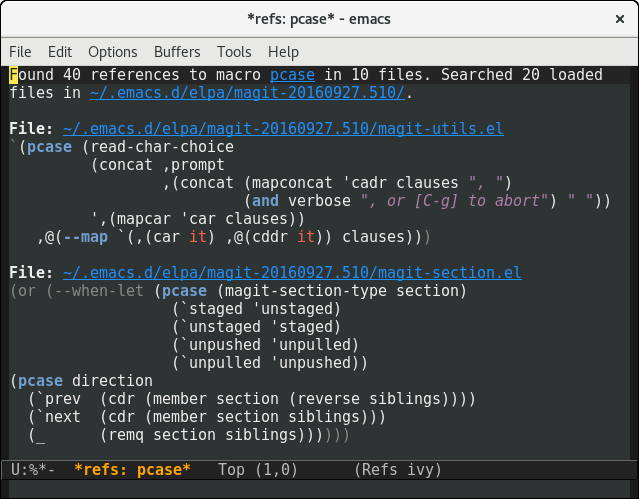elisp-refs is an intelligent code search for Emacs lisp.
It can find references to functions, macros or variables. Unlike a dumb text search, elisp-refs actually parses the code, so it's never confused by comments or variables with the same name as functions.
This is particularly useful for finding all the places a function is used, or finding examples of usage.
Interested readers may enjoy my blog post: Searching A Million Lines Of Lisp.
Install from MELPA (recommended) or just add elisp-refs to your load-path.
-
elisp-refs-function(find function calls) -
elisp-refs-macro(find macro calls) -
elisp-refs-variable(find variable references) -
elisp-refs-special(find special form calls) -
elisp-refs-symbol(find all references to a symbol)
These command search all the files currently loaded in your Emacs instance.
If called with a prefix, you can limit search results to specific directories. For example:
C-u M-x elisp-refs-macro RET pcase RET ~/.emacs.d/elpa/magit-20160927.510 RET
will search for uses of pcase in magit:
elisp-refs has street smarts: given (defun foo (bar) (baz)), it
understands that bar is a variable and baz is a function.
elisp-refs understands the following forms:
-
defundefsubstdefmacrocl-defun lambda-
letlet* -
funcallapply - sharp quoted expressions (e.g.
#'some-func)
elisp-refs understands elisp special forms, and a few common macros. However, it cannot understand arbitrary macros.
Therefore elisp-refs will assume that (other-macro (foo bar)) is a
function call to foo. If this is incorrect, you may wish to use the
command elisp-refs-symbol to find all references to the foo symbol.
If other-macro is a common macro, please consider submitting a patch
to elisp-refs--function-p to make elisp-refs smarter.
elisp-refs also does not support indirect calls.
;; Since we do a simple syntax tree walk, this isn't treated as a
;; call to foo.
(let ((x (symbol-function 'foo)))
(funcall x))
;; Similarly, indirect function calls are not treated as
;; function calls.
(defun call-func (x)
(funcall x))
(call-func 'foo)
;; However, if you use sharp quoting, elisp-refs knows it's a function
reference!
(call-func #'foo)You can run the tests with:
$ cask install
$ cask exec ert-runner
elisp-refs is CPU-intensive elisp and has been carefully optimised. You can run the benchmark script with:
$ cask install
$ ./bench.sh
New features are carefully measured to ensure performance does not get worse.
See elisp-refs-bench.el for more details.
xref-find-references: This command is included in Emacs 25.1, but it's based on a text search. It is confused by comments and strings, and cannot distinguish between functions and variables.
xrefs-find-references is also line oriented, so it does not show the whole sexp that matched your search. Since it requires text files, it doesn't search built-in .el.gz files.
TAGS: It is possible to record function references in TAGS files. Whilst universal-ctags (formerly known as exuberant-ctags) does provide the ability to find references, it is not supported in its lisp parser.
etags, the TAGS implementation shipped with Emacs, cannot find references (to my knowledge).
el-search allows you to search for arbitrary forms in elisp files. It's slower, but a much more general tool. Its design greatly influenced elisp-refs.
elisp-slime-nav finds definitions, not references. It's a great complementary tool.

